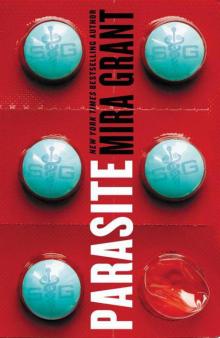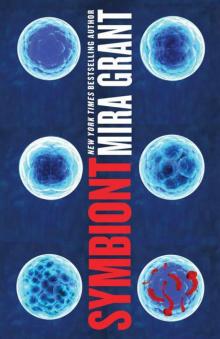- Home
- Grant, Mira
Parasite (Parasitology) Page 13
Parasite (Parasitology) Read online
Page 13
“Take her down,” said Dr. Banks implacably.
“Wait—what?” I took a step forward, and was promptly stopped by my own guards. They held me there as the other officers moved closer to Chave. “What’s going on? What’s wrong with her?”
No one answered me. The first of the officers reached Chave. Gun still raised, he pulled a baton from his belt and pressed it against her stomach, pressing a red button on its side at the same time. She shrieked as the baton crackled, forcing electricity into her body. Another officer stepped up behind her, doing the same thing. Chave’s shriek ended in a choking sound, and she began convulsing.
“Stop it! You’re killing her, stop it!” I shouted.
“Sally, you don’t understand,” said Dr. Banks. He must have pushed his way through the crowd to get to us. “I’m sorry. This is the only way.”
I turned to glare at him. “What’s going on?” I demanded. Chave should have collapsed long since, but somehow, she was still standing. Two more officers stepped up, pressing their batons against her side. Electricity crackled.
Chave began to scream.
It wasn’t a human scream; it was more like the sound a wounded animal makes when it hurts beyond its capacity to follow instinct’s instructions and keep silent, keep still. We had a dog left on the front step of the shelter once. His back section had been crushed by a truck, and he was making a sound just like the one Chave was making now, too raw to be considered a howl, but not the sort of sound you ever hear from a thinking creature.
Dr. Banks put his hands on my shoulders, like he was afraid that I might try to break away and run toward Chave. I didn’t try to shrug him off. I couldn’t imagine moving in that moment, not with Chave screaming, and more and more of the guards closing in around her, their stun batons already in their hands. This wasn’t real. This couldn’t be happening. This was something out of a horror movie. She’d been talking to me only a few minutes ago, she’d—
Chave stopped screaming and turned toward me, her body still convulsing with the electricity that was arcing through it. She shouldn’t have been standing. She didn’t fall. “Sah-lee,” she said, spitting out the two syllables of my name like they hurt her mouth. Dr. Banks tightened his hands on my shoulders. Someone else gasped. “Sah-lee,” said Chave again.
Then one of the officers slammed a stun baton across the back of her head, and Chave finally fell, crumpling to the plush carpet like an expensive toy discarded by a selfish child. Silence hung over the cafeteria, broken only by the sound of breathing, and muffled sobs from a few of the executives. Dr. Banks kept his hands on my shoulders, pressing down hard, as we looked at Chave’s body lying on the floor.
“She said my name,” I whispered. “Why did she say my name?”
No one answered me. Out of all the things that had happened since my arrival at SymboGen, somehow that seemed like the most dangerous one of all.
INTERLUDE I: EXODUS
The broken doors are open—come and enter and be home.
—SIMONE KIMBERLEY, DON’T GO OUT ALONE
We are our own judge, jury, and executioner. And we have been proven guilty.
—DR. RICHARD JABLONSKY
October 23, 2015: Time stamp 10:52.
[As before, the recording is perfect, and the lab is a gleaming miracle of science. The only difference is in the woman who stands in front of the camera. Her lab coat is rumpled, her hair in disarray. She looks like she has not slept in weeks.]
DR. CALE: Doctor Shanti Cale, final Diphyllobothrium symbogenesis viability test results. Those bastards. Those goddamn bastards…
[She stops, visibly composing herself.]
DR. CALE: Steven—Doctor Banks—has decided that we’re finished with laboratory testing, and can move on to live human subjects. I mean. Officially move on to live human subjects. He’s wrong. He’s not listening, but he’s wrong. Do you hear me, Steven? You’re wrong. And you’re going to pay for it. Not me.
[She produces a petri dish from her pocket, holding it up so that the camera can see. There is a white nutrient goo at the bottom. Any other contents are too small to be seen.]
DR. CALE: You can’t destroy all the evidence. I know you’re going to try, and I want you to understand that it is not possible. By the time you find this recording, I will be gone. Instructions have been left to tell you where to wire my money. You want your skeletons to stay buried, Steven? You want this house of cards to stay standing? You leave me alone, and you stay the hell away from my family.
Leave us the hell alone.
[The film ends there. Dr. Shanti Cale disappeared shortly thereafter. There are no records to indicate what she may have removed from the lab, or even whether she is still alive.]
[End report.]
STAGE I: IMPLANTATION
SymboGen: because good health starts within.
—EARLY SYMBOGEN ADVERTISING SLOGAN
Oh, won’t this just be the most fun we’ve ever had?
—DR. SHANTI CALE
I suppose this is when you ask me about the original trio. I met Richard in grad school, and we knew immediately that we had something special. Still, we were incomplete until we stumbled over Shanti. We were the Three Musketeers of bioengineering, and with us working together, there was nothing we couldn’t do. Maybe that’s why we started taking on bigger and bigger challenges. We truly believed that it was impossible for us to fail.
Some people will try to tell you Shanti was the brains of our operation, but they’re just talking trash for the sake of sounding like they know something I don’t want people to know. Shanti was the smartest of the three of us, but that’s like saying one firework is brighter than another. They’re all blazing too damn bright to look at. Isn’t that what matters? Burning so bright you paint the sky?
Shanti was the one who refused to admit there was such a thing as going too far. Richard was the one who reined her in when it looked like she was going to run right over the edge of the world. And me? I was the one who made everything work. Without me, SymboGen would never have existed. There are probably people who would say that was a good thing, too.
I have to admit, there are days when I think it would be a good thing. I might even be willing to give it all back if it meant I still had my friends. But you can’t go home again.
—FROM “KING OF THE WORMS,” AN INTERVIEW WITH DR. STEVEN BANKS, CO-FOUNDER OF SYMBOGEN. ORIGINALLY PUBLISHED IN ROLLING STONE, FEBRUARY 2027.
One of the more interesting realities of the SymboGen Intestinal Bodyguard™ campaign was the way the scientific team responsible for its development was handled. Dr. Banks appeared on talk shows and at scientific symposiums, lecturing on the wonders of their discovery. Dr. Jablonsky spoke at early functions, but quickly stopped making public appearances, choosing instead to focus on the scientific aspects of their work. Only one woman was involved in the Intestinal Bodyguard™ project: Dr. Shanti Cale, a photogenic, intense blonde whose early audience-acceptance scores were unbelievable. She would have been the perfect spokeswoman. Instead, she vanished without a trace shortly before the company’s IPO. Rumors of bribery have circulated almost since the date of her disappearance, but have never been proven. Whatever her side of the story, she has not been heard from, and the SymboGen brand is now well established worldwide.
As the face of SymboGen, Dr. Banks was the perfect blend of approachable and intelligent, the quintessential wise scientist. Perhaps the decision to put the other researchers behind the curtain was just one more piece in selling the unsellable.
—FROM SELLING THE UNSELLABLE: AMERICAN ADVERTISING THROUGH THE YEARS, BY MORGAN DEMPSEY, PUBLISHED 2026.
Chapter 8
AUGUST 2027
Security pulled me out of the chaos in the cafeteria and escorted me back down to the labs, ignoring my attempts to resist them. If I could take any comfort in my removal from the scene, it was this: I wasn’t the only one. Everyone who’d come into direct contact with Chave before she collapsed was being tak
en underground. The guards packed us into the elevators, maintaining a two-to-one ratio between security and people who didn’t have the right to carry guns inside the building.
Sherman wasn’t in my elevator. I stopped worrying about myself and worried about him instead as we made our descent. Anything to keep myself from worrying about Chave. She wasn’t dead, was she? She couldn’t be dead. She’d had some sort of a stroke, or she’d managed to catch whatever had infected Beverly’s original owner—she was sick. They wouldn’t kill her just for getting sick. “We don’t leave our employees without health care, ever,” was what Dr. Banks had said to me when we were sitting in his office together. How did this align with that?
Then the elevator doors opened to reveal four people in white biohazard suits, and I stopped worrying about anyone but myself. Their faces were covered by reflective plastic shields. I couldn’t tell who was inside. There was nothing to indicate whether they were people I knew or total strangers. One of the guards tried to take my arm and pull me out of the elevator. I jerked away from him, backing up until my shoulders hit the far wall.
“I’m not going with you until you tell me what’s going on,” I said flatly. “So you can just keep your damn hands to yourself.”
“Ms. Mitchell, we have been authorized to sedate you if you refuse to cooperate,” said one of the biohazard suits. The voice was filtered so heavily that it was neither male nor female: it was as sterile and mechanical as our environment. I couldn’t even think of them as human.
Another group from the cafeteria walked by, escorted by its own quartet of biohazard suits. Sherman was there, looking dazed and slightly battered, like he’d been through a war and not just a brief fight with a coworker. He stopped when he saw me, bringing the whole procession to a halt. “Sal! Are you hurt?”
“What’s going on, Sherman?” I gestured to the suits, managing to encompass all eight of them in one spread of my hands. “Why won’t they tell us anything?”
“Chave was ill, pet,” he said, a nervous expression washing away all his normal animation. “She needs medical attention, and the rest of us need looking over to be sure we’re not showing symptoms of what she’s got.”
“She wasn’t even showing symptoms before she flipped out!”
“That’s what we’re afraid of,” muttered one of the guards.
I whipped around to face him. The biohazard suits with Sherman’s group took that opportunity to get moving again, sweeping Sherman and the others off down the hall. “Mind yourself, and stick with the doctors, Sal!” called Sherman, and then he was gone, carted off with the others, and I was alone among strangers.
There was no way out, and no one was telling me anything. But I trusted Sherman, and so when the biohazard suits gestured for me to step out of the elevator, I didn’t argue further. I just went.
I’d always known the laboratory floor was large—larger than the footprint of the main building, even, since SymboGen owned enough property to let them expand as needed. I hadn’t realized it was large enough for them to build sufficient individual isolation rooms to hold all the people who’d been removed from the cafeteria. Most chilling of all, as two guards were in the process of escorting me into my room, I saw a third guard being escorted into the room across the hall. We were all being locked up.
One of the biohazard suits followed me into the tiny room, which was painted the bland pastel green of a doctor’s waiting area. There was a bench, covered in white paper, and the standard array of cabinets and counters lined two of the walls. A set of folded blue scrubs was stacked on the bench, next to a pair of plain white slippers.
“Please remove your clothing,” said the biohazard suit.
“Or what?” I demanded. Getting naked wasn’t a problem. I just didn’t feel like cooperating with someone who wouldn’t show me their face.
“Or we are authorized to sedate you,” said the biohazard suit.
“What ‘we’?” I asked. “There’s only one of you in here. And who authorized you to sedate me? I didn’t sign anything that said you could sedate me.”
“Ms. Mitchell, please believe me when I say that we do not want to do anything to harm you. But if you force my hand, I will call my associates into this room, and you will remove your clothing. Now please.”
I hesitated. Chave worked for SymboGen. I didn’t. And when Chave wouldn’t calm down, they’d zapped her until she stopped moving. Chave was probably dead. Did I believe the biohazard suit when it said I’d be sedated if I didn’t cooperate? Yes, I did. I glared at the suit’s mask as I removed my clothes, piling them on the floor. I started to reach for the scrubs.
“Stop where you are, Ms. Mitchell.” The biohazard suit’s air filter allowed no inflection in the voice, but the feeling of menace still managed to come through in the way the words were bitten off. “I will need to examine you.”
“What?” I crossed my arms over my chest, covering myself. “What are you talking about?”
“The risk of infection is high enough to require a visual examination. Please lower your arms.”
“I want to talk to Dr. Banks.”
“Dr. Banks is being examined. He will be happy to speak with you once you are both finished.”
That stopped me cold, because somehow, I didn’t doubt what I was being told. Dr. Banks—the owner of the company, the richest man in North America, and one of the most powerful people in the developed world—was being strip-searched and examined for signs of an undisclosed “infection.” Maybe he was getting examined in his office rather than in one of these generic little isolation rooms, but that didn’t change the fact that he was getting the same treatment I was. And that terrified me.
Dropping my arms to my sides, I turned to face the biohazard suit. It nodded. “Thank you,” it said. “Now please stand with your feet shoulder-width apart and raise your arms to shoulder level. This will be a visual examination only. I will not touch you. Do you understand?”
“What’s your name?” I countered.
The biohazard suit sighed. I wouldn’t have thought the filters would let the sound escape, but they did, and it carried a level of human frustration that all the words hadn’t been able to convey. “It’s Dr. Lo, Sally. Now please, will you do as I am asking?”
“You could have said that before, you know.” I moved as I spoke, getting into the position she had requested. It felt less strange now that I knew she was someone familiar and not just a faceless automaton from the depths of SymboGen. At the same time, the fact that Dr. Lo was treating me as a threat—not just furniture, but something dangerous—worried me. “Why didn’t you tell me who you were?”
“Because I was more concerned with your health than with observing social pleasantries. Hold still.” Dr. Lo reached into a pocket on the leg of her biohazard suit, producing a long tube that looked like it had been detached from the overhead lights. She flicked a switch at its base, and it came on, glowing a deep shade of purple. Dr. Lo began running it through the air a few inches away from me, watching the way the purple light reflected off my skin.
“What is that?” I asked.
“Don’t move, Sally,” she said, crouching to run the light along my stomach and legs. She was quick, and thorough: not an inch of me was left unexamined. True to her word, she didn’t touch me. That didn’t stop me from feeling like there was something deeply inappropriate about having her looking at me that closely, especially with the protective suit between us. Whatever she was looking for, it wasn’t anything good.
Finally, she straightened, clicking off her wand. “You can put the scrubs on now,” she said, as she returned it to her pocket. “You’re clean.”
“Clean of what?” I asked, dropping my arms back to my sides before turning to reach for the scrubs.
“That’s a discussion for you to have with Dr. Banks, not with me. I’m just here to make sure you don’t present a danger to yourself or others.” Dr. Lo turned away from me and knocked twice on the door. After a moment, one
of the security officers opened it. This one hadn’t been present in the cafeteria. I was starting to think that SymboGen had its own private police force, and that wasn’t a comforting thought. The line between “police force” and “army” is narrow under the best of circumstances, and we were no longer operating under the best of circumstances.
“Yes?” asked the officer.
“She’s clean,” replied Dr. Lo. “I need to go to decontamination.” Even clean, I was apparently enough of a risk to require cleaning a biohazard safety suit. I shrank back from the door, suddenly terrified of my own skin. What kind of contagion had we been exposed to? Was I going to go like Chave, normal one minute, empty-eyed and absent the next?
My motion must have caught Dr. Lo’s eye, somehow; I had no idea what the peripheral vision was like in a biohazard suit, but she turned back toward me, and asked, “Now you’re afraid? After the worst parts are over, now you’re afraid? I know we’ve given you a clean bill of health, Sally, but you may want to consider therapy.”
I glared at her. She left the room, and the officer stepped into the doorway, preventing me from following her out. At least he wasn’t wearing a mask. I felt less like a risk to the health of everyone around me when I looked at another face without a piece of plastic in the way.
“I’m sorry for the inconvenience, Ms. Mitchell,” he said politely.
“I want to speak to Dr. Banks,” I said, and stepped into the slippers.
“He’s still undergoing examination, but I’m sure he’ll be happy to speak with you once he’s free,” said the officer.
Still undergoing… I stiffened. “Sherman.” What was his last name? Shit. “Sherman Lewis. He’s one of Dr. Banks’s assistants. He was brought down here with the rest of us. Is he all right? Have they finished examining him?”

 How Green This Land, How Blue This Sea: A Newsflesh Novella
How Green This Land, How Blue This Sea: A Newsflesh Novella Parasite (Parasitology)
Parasite (Parasitology) Symbiont (Parasitology Book 2)
Symbiont (Parasitology Book 2) Please Do Not Taunt the Octopus
Please Do Not Taunt the Octopus